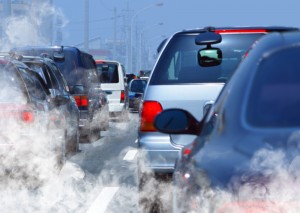One of the Juncker Commission’s favourite catchphrases is to deliver ‘better regulation for better results.’ At the same time, it claims it will serve citizens and restore confidence in the European Union project. Unfortunately, recent developments suggest it is struggling to reconcile these grand statements. ‘Better regulation’ seems to lend itself to bad policy-making and to be at the expense of the rule of law and the protection of citizens.
Cars and their emissions
On car emissions, for example, the EU adopted a regulation back in 2007 setting limits on how much of the harmful air pollutants known as NOx that a car can emit on the road. These emissions are dangerous for citizens’ health, leading to cardiovascular and respiratory diseases, and are estimated to cause as many as 75,000 premature deaths in Europe every year [1].
In trying to appease voices critical of its policies, the Commission is giving up on some of its core responsibilities.
 However a secondary piece of legislation adopted by the Commission and national experts last year, which the European Parliament failed to veto, more than doubles that limit. Because this ‘implementing measure’ contradicts the original limits in the regulation, and an implementing measure can only provide details but not contradict the overarching law, it is an infringement of the EU law-making process. What’s more, there have been reports that it was car makers, together with some national governments, who pushed EU decision makers to increase the emission limits, and not sound science.
However a secondary piece of legislation adopted by the Commission and national experts last year, which the European Parliament failed to veto, more than doubles that limit. Because this ‘implementing measure’ contradicts the original limits in the regulation, and an implementing measure can only provide details but not contradict the overarching law, it is an infringement of the EU law-making process. What’s more, there have been reports that it was car makers, together with some national governments, who pushed EU decision makers to increase the emission limits, and not sound science.
Chemical disruptors
Then take a look at the mess surrounding endocrine disruptors (EDCs). A 2012 regulation obliged the Commission to define what could and couldn’t be classified as an EDC by the end of 2013. This was a necessary step to prevent consumers from being exposed to dangerous chemicals which can interfere with the body’s hormonal system. EDCs may lead to incurable health problems such as obesity, diabetes, infertility, genital malformations, and cancer.
‘Better regulation’ seems to lend itself to bad policy-making
In early 2016, we are still waiting. The Commission has instead been condemned by the European Court of Justice for not abiding by its obligations under the regulation. You might expect an EU institution to then take a low profile and ensure it meets a Court decision – after all this is what the Commission expects of Member States who break EU law. But instead it indicated that it would just continue working on an impact assessment the Court said was not necessary.
How safe is our data?
More recently, the Commission announced it had reached a new deal with the US to transfer data between the EU and the US. The European Court of Justice had previously ruled in the so-called Schrems case that the previous EU/US agreement which set conditions for the export of EU citizens’ personal data to the US was illegal under EU law. The Court stated that EU citizens’ personal data is not sufficiently protected by the agreement. The new deal, misleadingly called ’Privacy Shield’, is supposed to reassure EU citizens that their data is protected in the US in the same way as it is in the EU.
What the Commission calls ‘better’ regulation should not come at any cost.
 But are we supposed to be reassured? The deal was negotiated without any involvement of the data protection authorities, let alone public interest organisations, and the Commission was under pressure from many, including US, business interests, not to interfere with data flowing across the Atlantic. The Commission has already held meetings with business representatives to inform them of the details of the new agreement, but the actual texts are still not available publically. Even more worrying is that this Privacy Shield does not solve the underlying problem: the EU and US have fundamentally different and therefore incompatible approaches to personal data protection.
But are we supposed to be reassured? The deal was negotiated without any involvement of the data protection authorities, let alone public interest organisations, and the Commission was under pressure from many, including US, business interests, not to interfere with data flowing across the Atlantic. The Commission has already held meetings with business representatives to inform them of the details of the new agreement, but the actual texts are still not available publically. Even more worrying is that this Privacy Shield does not solve the underlying problem: the EU and US have fundamentally different and therefore incompatible approaches to personal data protection.
The Commission is showing some worrying signs. In trying to appease voices critical of its policies, it is giving up on some of its core responsibilities. What the Commission calls ‘better’ regulation should not come at any cost. And certainly not at the expense of fundamental rights or of consumer protection.
————————————————————–
[1] See European Environment Agency report ‘Air Quality in Europe – 2015’, page 44.
[2] More on the EU’s implementing measures and comitology process here.

